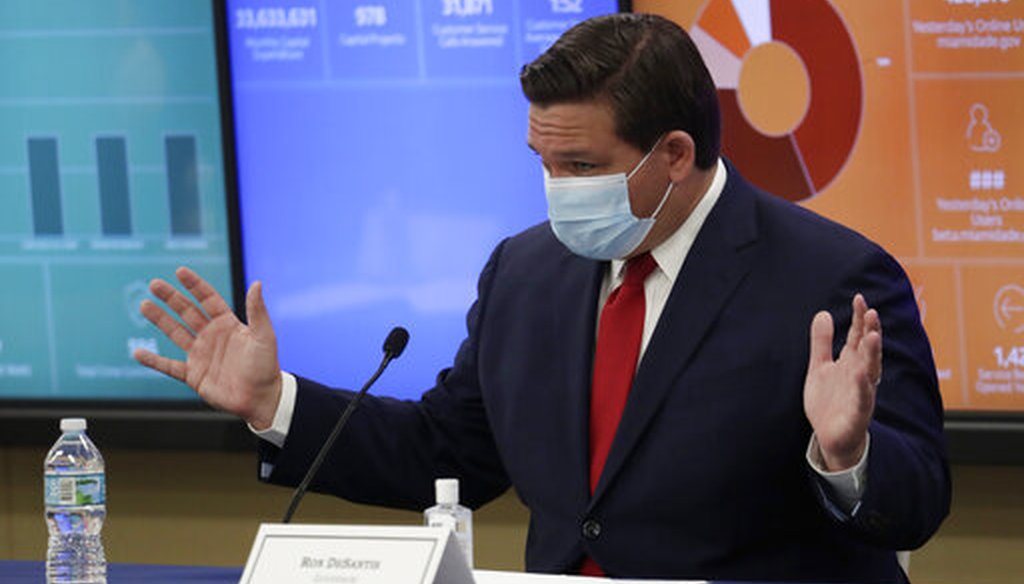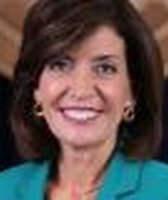Stand up for the facts!
Our only agenda is to publish the truth so you can be an informed participant in democracy.
We need your help.
I would like to contribute

Florida Gov. Ron DeSantis speaks during a roundtable discussion with Miami-Dade County mayors during the coronavirus pandemic, Tuesday, July 14, 2020, in Miami. (AP)
If Your Time is short
-
There is limited research on COVID-19 and schoolchildren so far. It is difficult to assess how much children may have spread the virus since schools shut down early in the pandemic.
-
An essay in the journal Pediatrics concluded that transmission from children to other people is infrequent. But that could be because school closures reduced the opportunities for children to become infected.
-
Experts warn that success stories of school reopenings in Europe may not be replicated in areas with higher transmission rates such as Florida.
Florida Gov. Ron DeSantis and his administration have provided mixed messages about schools amid soaring COVID-19 cases, calling for them to reopen in August but also offer an online education option.
But DeSantis has been consistent in his assurance that schoolchildren aren’t spreading the virus to adults.
"I think it has been found over and over again, as people have looked at this and studied this, particularly in Europe, that the schoolchildren actually aren’t vectors for this," DeSantis said at a news conference July 11. "For whatever reason they usually get infected by the parents, they usually aren’t infecting adults. Places that have had schools open have not seen the schools contribute to increasing the prevalence of the virus."
Days later, he made a similar statement in a roundtable with mayors in Miami-Dade County.
DeSantis presented his case as settled science, but we found that there isn’t enough evidence to reach that conclusion yet. Since research is limited, we won’t yet put his statement on our Truth-O-Meter.
Sign up for PolitiFact texts
Some research from other countries suggests that schoolchildren may not be the drivers of virus transmission. Children account for far fewer confirmed COVID-19 cases than adults, and are less likely to develop complications.
But much of the research involves small numbers, and some has not yet been peer-reviewed. And the data is limited because schools worldwide were largely shut down starting early in the pandemic.
"There aren’t a lot of kids who have had a normal day in the past four months," John Brownstein, a professor of pediatrics at Harvard Medical School, told ABC News.
Children appear to be less likely to transmit than adults, "although the science isn’t completely settled on that," said Dr. Sean O’Leary, vice chair of the American Academy of Pediatrics’ Committee on Infectious Diseases. "But to say children don’t transmit at all is wrong."
DeSantis’ office did not respond to our request for evidence for his contention that children are not vectors for the virus. But a July commentary published in the journal of the American Academy of Pediatrics supported parts of his claim.
The authors, pediatric infectious-disease specialists at the University of Vermont, based their conclusions on studies in Switzerland, China, France and Australia. One author, William Raszka, told us some of the studies had been peer-reviewed or were published by government offices.
His paper cited a study published in Pediatrics that looked at 39 infected children in Switzerland and found only three cases where the child developed symptoms before others in the household. However the authors noted limitations including that the study sample likely does not broadly represent pediatric cases during this time period.
Arnaud L’Huillier, one of the authors of the study, told PolitiFact that children can emit live viruses, so there is no biological reason why they couldn’t be contagious.
But the dynamics of the virus vary by age.
"Children much less frequently transmit SARS-CoV-2 than adults, and this is most striking in younger children," Raszka said. "I worry more about high school students."
A National Institutes of Health study will follow 2,000 families for six months to determine in part how often children get infected and then infect their families. For now, U.S. health officials have discussed a lack of data on children and COVID-19 transmission.
"We don't really know exactly what the efficiency of spread is, first of all how many children get infected," Dr. Anthony Fauci, the nation’s leading infectious-disease specialist, said at a Senate hearing June 30. "But if the rate of infection is down and they don't readily transmit to their parents and family members, that's going to be very important in the decision-making process of opening schools," he said.
Fauci warned that the U.S. isn’t comparable with countries in Europe that shut down more completely.
RELATED: Tucker Carlson claims coronavirus ‘poses virtually zero threat’ to children, most teachers
Florida officials like DeSantis nonetheless cite Europe’s experience to back their push for reopening schools.
Florida’s education commissioner tweeted an article about the first phase of a study in Germany. It concluded that reopened schools did not become hotspots. The study by the University Hospital Dresden of 2,000 children and teachers at a school found few COVID-19 antibodies among them. Reinhard Berner, a professor of pediatrics at the hospital, said that the study was representative for the German state of Saxony, which has a relatively low rate of infection.
Some European countries did have success in reopening schools, but most didn’t reopen school amid a spike of outbreaks like the one Florida and some other states are experiencing now.
By contrast, Israel reopened schools in May, and within weeks hundreds of students and staff tested positive for the disease. Israel did not coordinate removing lockdown restrictions for schools and public gatherings, said Nadav Davidovitch, director of Ben-Gurion University’s school of public health.
"Our experience in Israel is that children are less infected, less infecting and their illness is usually milder, but we had clusters and very rarely also more severe cases," Davidovitch told PolitiFact.
Other experts warn that the public should not read too much into the fact that fewer children than adults have contracted the virus.
"For example, it is possible that the impact on children was limited because they were sheltered during the height of community disease," said Marissa J. Levine, a University of South Florida public health professor. "I hope that doesn’t change when schools are opened up but, in effect, school opening under these conditions would be an experiment for which we would not know the answers until after the fact."
Our Sources
CDC Covid Data Tracker, Demographic Trends of COVID-19 cases and deaths in the US reported to CDC, July 13, 2020
Science, School openings across globe suggest ways to keep coronavirus at bay, despite outbreaks, July 7, 2020
New York Times, New Studies Add to Evidence that Children May Transmit the Coronavirus, May 5, 2020
AP, Fact check: Trump team’s false comfort on coronavirus as they push to reopen schools, July 13, 2020
Pediatrics commentary, COVID-19 Transmission and Children: The Child Is Not to Blame, July 8, 2020
Pediatrics, COVID-19 in Children and the Dynamics of Infection in Families, July 2020
Oxford Academic, Cluster of Coronavirus Disease 2019 (COVID-19) in the French Alps, February 2020, April 11, 2020
University of Vermont Today, Kids Rarely Transmit Covid-19, Say UVM Docs in Top Journal, July 2020
New York Times, How to Reopen Schools: What Science and Other Countries Teach Us, July 11, 2020
ABC News, 3 things to know about kids, schools and COVID-19, July 9, 2020
CNN, Fact check: What role do kids play in spreading the coronavirus? July 10, 2020
Sun Sentinel, Florida COVID-19 cases top a quarter-million; deaths exceed 90 for third straight day, July 11, 2020
Rev.com, Florida Governor Ron DeSantis COVID-19 Press Conference Transcript, July 13, 2020
White House, Press Briefing by Vice President Pence and Members of the Coronavirus Task Force, July 8, 2020
National Institutes of Health, Study to determine incidence of novel coronavirus infection in U.S. children begins, May 4, 2020
U.S. Centers for Disease Control and Prevention research letter, Culture-Competent SARS-CoV-2 in Nasopharynx of Symptomatic Neonates, Children, and Adolescents, October 2020
MedrxIV pre-print article, Cluster of COVID-19 in northern France: A retrospective closed cohort study, 2020
ScienceMag, School openings across globe suggest ways to keep coronavirus at bay, despite outbreaks, July 7, 2020
University of Dresden, Degree of immunization lower than expected - schools have not developed into hotspots, July 13, 2020
Florida Education Commissioner Richard Corcoran, Tweet, July 14, 2020
CNBC, Schools have low coronavirus infection rate, German study finds, July 14, 2020
PolitiFact, Some COVID-19 deaths have been children, July 10, 2020
PolitiFact, Tucker Carlson claims coronavirus ‘poses virtually zero threat’ to children, most teachers, July 13, 2020
Email interview, Aileen M. Marty, Director, FIU Health Travel Medicine Program and Vaccine Clinic Commander, and professor of infectious diseases, July 13, 2020
Email interview, Marissa Levine, Professor, Director, Center for Leadership in Public Health Practice at University of South Florida, July 13, 2020
Email interview, Jeffrey Shaman, Columbia University environmental health sciences professor, July 13, 2020
Email interview, William Hanage, associate professor of Epidemiology at Harvard, July 13, 2020
Email interview, Arnaud G. L'Huillier of the Geneva University Hospitals and medical school, July 15, 2020Email interview, William Raszka, pediatric infectious disease specialist at the University of Vermont’s Larner College of Medicine and an associate editor of Pediatrics, July 13, 2020
Email interview, Sean O’Leary, vice chair of the American Academy of Pediatrics Committee on Infectious Diseases, July 13, 2020
Email interview, Nadav Davidovitch, director of Ben-Gurion University’s school of public health, July 14, 2020


































